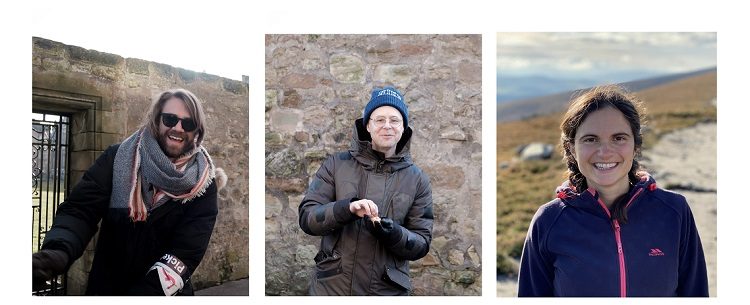Three major prizes for St Andrews

Three top research prizes for redefining the way we engage with anonymous Roman texts, for classical reception studies and for ground-breaking study on volcanic activity have been awarded to academics at the University of St Andrews by a major national funding body.
Dr Tom Geue and Dr Henry Stead, both of the School of Classics, and Dr Andrea Burke of the School of Earth and Environmental Sciences at the University have been recognised with Philip Leverhulme Prizes of £100,000 each from the Leverhulme Trust.
Dr Geue was awarded the prize for his work on anonymous Roman literature, in particular his last book Author Unknown which sought to treat authorless texts as special literary specimens with their own capabilities, rather than defective beings in constant search of an author.
He will use the prize money to start two projects: a book seeking to devise new ways of doing literary criticism on literature composed with the aid of the enslaved, and a history of materialism as a philosophy and approach to literature.
Dr Geue said: “I’m shocked and genuinely surprised. Boundless thanks to the Leverhulme Trust for this gift. I can’t wait to get stuck in.
“Thank you to the amazing institution that is the St Andrews School of Classics, and to all the students, mentors, colleagues, and friends who believed in me.”
Dr Burke was awarded a prize for her work on isotope geochemistry and paleoclimate. Her work focuses on how the Earth’s climate responds to volcanic events by exploring ice core records of past eruptions.
She will now push the boundaries of analytical geochemistry by using one of the world’s first collision-cell mass spectrometers to create even more accurate reconstructions, which will help inform how such volcanic activity could impact on climate change in the future.
Dr Burke said: “Understanding climate change has never been more important. The methods I’ve developed at St Andrews are now at a point where we can make major progress in understanding climate forcing and feedbacks by looking at these past episodes of major environmental change.
“I’ve very grateful to the Leverhulme Trust for supporting me in this effort, as well as the University and the School of Earth and Environmental Sciences.”
Dr Henry Stead’s work focuses on how the texts, images, objects and ideas from Greco-Roman antiquity are seen, understood and put to new uses in the modern world.
His recent book A People’s History of Classics, co-written with Professor Edith Hall, explores the relationships between Classics and social class in Britain until World War 2.
He will now use the prize money to continue working on a collaborative project exploring the intersection between Classics and international communism to 1956 and exploring how the Classics faired during shifts to Eurocommunism, Maoism, Civil Rights and the New Left.
Dr Stead said: “By focusing on the popular, radical and defiant underbelly of British classics over the past decade my work has begun to challenge long-held perceptions of classics both within academia and in the public imagination.”
“A study now into classics on the long, surprisingly diverse and ultimately incomplete ‘British Road to Socialism’ will offer a fresh angle on contemporary debates surrounding the paradoxical ‘inherent’ conservatism and elitism of the discipline and the wide-ranging cultural experience that it has simultaneously enabled.”
The Leverhulme Trust was established by the Will of William Hesketh Lever, the founder of Lever Brothers. Since 1925 the Trust has provided grants and scholarships for research and education. Today it is one of the largest all-subject providers of research funding in the UK, distributing approximately £100m a year. For more information about the Trust, visit the website or follow the Trust on Twitter @LeverhulmeTrust.
Issued by the University of St Andrews Communications Office.